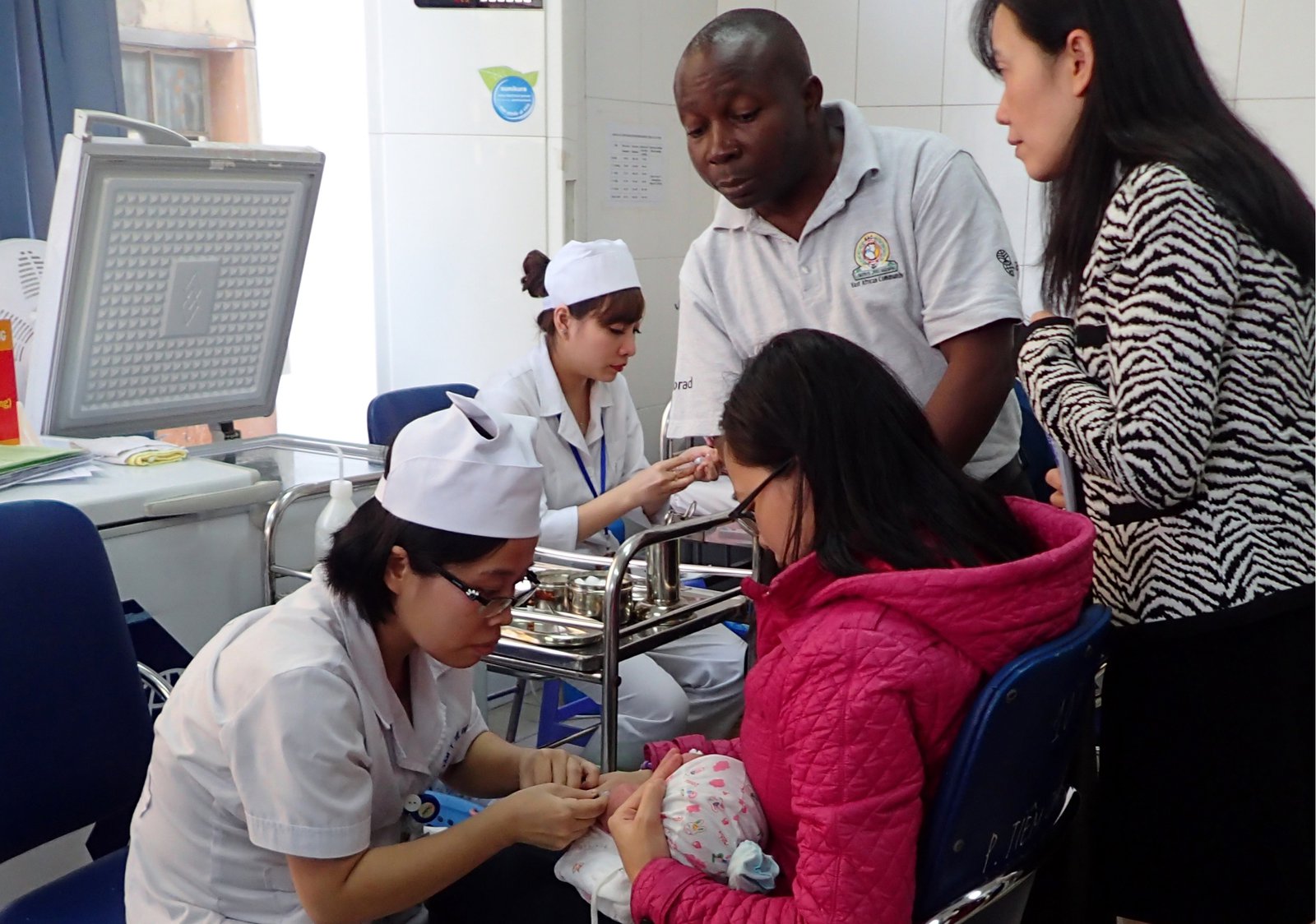Editor’s note: Recently, PATH led a study tour of Vietnam’s immunization supply chain that included officials from Uganda and Vietnam so both groups could exchange insights—and discover what’s possible. Guest contributor Dr. Henry Luzze, deputy program manager of Uganda National Expanded Programme on Immunization (UNEPI), shares his experience with us.
Every fifth child still lacks access to vaccines globally, and more than 1.5 million children die from vaccine-preventable diseases each year. By exchanging insights and lessons learned with our peers, we are working together to close immunization gaps. There remains much to be done to ensure that immunization programs are safely and efficiently reaching and delivering lifesaving vaccines to all who need them. But if Vietnam can do it, Uganda can do it.
Supply chain performance matters
Uganda and Vietnam share neither the same language nor food preferences, but both countries strive to achieve the same health goals—and face similar challenges to achieving them.
Like immunization programs around the world, each of our national immunization efforts center on safely and efficiently reaching and delivering vaccines to all our citizens. One of the biggest challenges we must overcome is the maintenance and repair of the thousands of refrigerators, cold boxes, and freezers that help keep vaccines cool from the moment they arrive in the country to their point of use in the health centers and rural outreach posts where parents bring their children for immunizations.
In 2014, a cold chain assessment found that 26 percent of refrigerators in Uganda were not functioning as required. Such equipment breakdowns are problematic for health staff who must divert vaccine supplies to facilities with more adequate refrigeration. They can also threaten product availability and potency if the vaccines are exposed to higher temperatures, leading to unnecessary vaccine wastage and inadequate protection from disease.

During a study tour, Dr. Luzze observes an immunization session at a provincial medical center in Vietnam. Photo credit: PATH.
Key learnings from Vietnam
My colleagues and I were therefore pleased to participate in a recent study tour, organized by PATH, to see firsthand how Vietnam is improving its immunization supply chain—the network of staff, equipment, vehicles, and data that get vaccines safely from manufacturers to health centers and other access points. The tour’s peer-to-peer learning framework enabled us to hear directly from our Vietnam counterparts about the systems and protocols they’ve developed to address their equipment maintenance issues in collaboration with the Luxembourg Agency for Development Cooperation.
In both Vietnam and Uganda, immunization coverage is higher in areas with better performing supply chains, but especially limited in rural areas that grapple with access and infrastructure challenges. To better meet rural health needs, we learned that officials in Vietnam decentralized certain roles and responsibilities, which empowered district leaders to adapt delivery strategies for the local environment. They also developed staff trainings, including retraining programs, and established set schedules for data collection and the routine maintenance of equipment.
It was inspiring to discover that—with these adjustments—the problem of equipment maintenance can be solved.

Study tour participants visit the Khanh Vinh District Medical Center and pose for a group photo under a banner that in Vietnamese reads “Preventative vaccine is safe and effective.” (Dr. Luzze is second from left, front row.) Photo: PATH.
Addressing gaps in Uganda and across Africa
As we consider new approaches, one thing is clear: investments in improving immunization supply chain performance must be part of the solution.
“If Vietnam can do it, Uganda can do it.”
UNEPI and our country’s network of national medical stores are working with PATH and other partners to pinpoint specific supply chain bottlenecks and address them with innovative technological and programmatic solutions. Such efforts are increasingly important for countries, like Uganda, that now manage larger and more complex immunization programs.
Uganda is committed to addressing even the most difficult problems that prevent us from reaching all families with lifesaving vaccines. We also commit to sharing key learnings with our East and Southern African peers to strengthen immunization systems, and save lives. That is why we applaud the World Health Organization Regional Office for Africa for convening the continent’s First Ministerial Conference on Immunization this February 24-25 in Addis Ababa. There, immunization program experts and decision-makers from across Africa will come together to discuss and ensure that countries across Africa are taking steps to close immunization gaps.
It was a great honor to meet with officials from Vietnam, who believe—as we do—that immunization is a powerful way to improve health and well-being in their country. We appreciate their hospitality, and we look forward to a strong working partnership with them, and with our colleagues across Africa, so every child can benefit from lifesaving vaccines.
